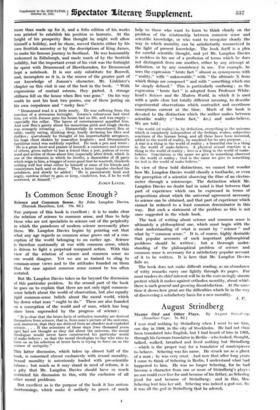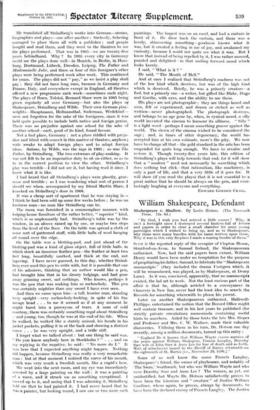August Strindberg
Master Olof and Other Plays. By August Strindl erg. (Jonathan Cape. 7s. 6d.) I II-4D read nothing by Strindberg when I went to sec him, one day in 1908, in the city of Stockholm. He had not t hen been translated into English, but I had heard of him in 1905, through, his German translator in Berlin—who looked, thought, talked, walked, breathed and lived nothing but Strindbeig --which is the proper way for a translator of masterpieces to behave. Schering was his name. He struck me as a gho§t of a man ; he was very ernst. And now that after long years I come to think of Schering in Berlin, I understand what had happened to him. He was no longer Schering, for he had become a character from one or more of Strindberg's plays : no son could ever live for and because of his father, as Schering lived for and because of Strindberg; and in this, Mrs. Schering lent him her aid. Schering was indeed a god-son, for it was all the god in Strindberg that he adored. He translated all-Strindbeig's works into German—stories, biographies and plays—one after another : tirelessly, Schering managed to place them all with a publisher ; and people bought and read them, and they went to the theatres to see the plays performed. That was in 1905—we are twenty-five years behindhand. Why ? In 1905 every city in Germany could see the plays done well—in Munich, in Berlin, in Ham- burg, Dortmund, Lubeck, Dresden, Leipzig, The Father and Mademoiselle Julie, and three or four of this foreigner's other plays were being performed week after week. This continued for years. The plays did not " pay," as we insist a play shall pay : they did not have long runs, because in Germany and France, Italy, and everywhere except in England, all theatres offered a new programme each week—sometimes each night. The plays of Ibsen, Tolstoi, Bernard Shaw were in 1905 being given regularly all over Germany—but also the plays of Shakespeare, Strindberg and Wilde. Their own German play- wrights—Hauptmann, Hofmansthal, Suderman, Wedekind- were not forgotten for the sake of the foreigners, .since it was held quite possible to include both native and foreign genius. There was no prejudice against one school for the sake of another school—each, good of its kind, found favour.
Not a bad place, Germany : not a place riddled with preju- dice and blind with conceit in this matter of theatres, anyhow; wide awake to adapt foreign plays and to adopt foreign ideas. Salome, by Wilde, was the rage in 1905 ; so was The Father, by Strindberg. The two extremes of play-making. It was not felt to be an imperative duty to sit on either, so as to he in the correct position to view the other. Strindberg's play was terrible—I did not see it, but having read it since, I know what it is like.
I had heard that all Strindberg's plays were ghostly, grue- some and terrible ; so I was wondering what sort of person I should see when, accompanied by my friend Martin Shaw, I knocked on Strindberg's door in 1908.
It was a cheap sort of apartment that he was staying in— I think he had been sold up some few weeks before ; he was no business man—no man like Strindberg can be.
The room was furnished in a commonplace manner, with lodging-house furniture of the rather better, " superior " kind, which is so unpleasantly bad. Strindberg's table was by the window, in an alcove raised up by one, or maybe two steps from the level of the floor. On the table was spread a cloth of some sort of patterned stuff, with little balls of wool hanging all round over the edge.
On the table was a blotting-pad, and just ahead of the blotting-pad was a kind of glass object, full of little balls, in which stuck an immense feather pen—the feather at least two feet long, beautifully marked, and thick at the end, not tapering. I have never guessed, to this day, whether Strind- berg ever used this pen to write with, but it is possible that one of his admirers, thinking that an author would like a pen, had brought him that in his dreary lodgings, and had gone away grinning sweet, sad nothings. Who knows, perhaps it was the pen that was making him so melancholy. This pen was certainly mightier than any sword I have ever seen.
And then we came upon him—a tall, leonine man, standing very upright—very melancholy-looking, in spite of his fine savage head . . . to me it seemed as if at any moment he might burst into a paroxysm of tears. A man of cold Courtesy, there was certainly something regal about Strindberg — and young, too, though he was at the end of his life. When he walked, he walked like a stately animal, his hands in his jacket pockets, pulling it in at the back and showing a distinct curve . . . he was very upright, and a trifle stiff.
I forget what we talked about : but one thing he said was, " Do you know anybody here in Stockholm ? " . . . and on my replying in the negative, he said : No more do I." It was here that I expected anything might happen. Nothing did happen, because Strindberg was really a very remarkable man : but at that moment I noticed the curve of his mouth, which was very much a Swedish mouth, like a cupid's bow.
We went into the next room, and my eye was immediately arrested by a large painting on the wall : it was a painting of a wave, and it struck me as something exceptional. I moved up to it, and seeing that I was admiring it, Strindberg told me that he had painted it. I had never heard that he was a painter, but looking round, I saw one or two more such
paintings. The largest was on an easel, and had a curtain in front of it. He drew back the curtain, and there was a lovely, shimmering something—goodness knows what it was, but it created a feeling in me of joy, and awakened my curiosity, because I could not quite see what it was. But I know that instead of being repelled by it, I was rather amused, puzzled and delighted—in that smiling forward mood which looks keenly.
I said, " What is it ? "
He said, " The Mouth of Hell."
And at once I realized that Strindberg's madness was not of the low kind which deceives, but was of the high kind which is deceived. Briefly, he was a princely creature—a fool, but a princely one—a writer, but gifted like Blake, Hugo and Goethe, with eyes, and the ability to use them.
His plays are, not photographic ; they are things heard and seen, felt or experienced, and drawn or etched as well as written—never photographed. The photograph destroys, and belongs to an age gone by, when, in cynical mood, a silly world invented the cinema to humour its silliness. " Silly " is a light word—perhaps I mean something graver against the world. The clown of the cinema wished to be considered the sage ; and, in times of utter degeneracy, the world has accepted him at his own estimate, more's the pity. We now have to change all that—the gold standard in the arts has been suspended for quite long enough. We have to revalue and restore it. Though twenty-five years late, this edition of Strindberg's plays will help towards that end, for it will show that a " modern " need not necessarily be something which does nothing but click—that rationalism, like machinery, is only a part of life, and that a very little of it goes far. It will show (if you read the plays) that it is not essential to a great author that he should be always on the grin, and ever- lastingly laughing at everyone and everything.
EDWARD GORDON CRAIG.















































 Previous page
Previous page